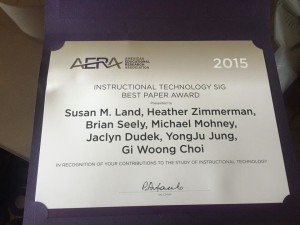Susan led our team on a paper that won the best paper award for the American Education Research Association (AERA) Special Interest Group Instructional Technology (SIG IT).
Land, S. M., Zimmerman, H. T., Seely, B. J., Mohney, M. R., Dudek, J., Jung, Y., & Choi, G. W., (2015, April). Photo-capture and annotations supporting observations in outdoor mobile learning. 2015 Annual Meeting of the American Educational Research Association. Chicago, IL.


